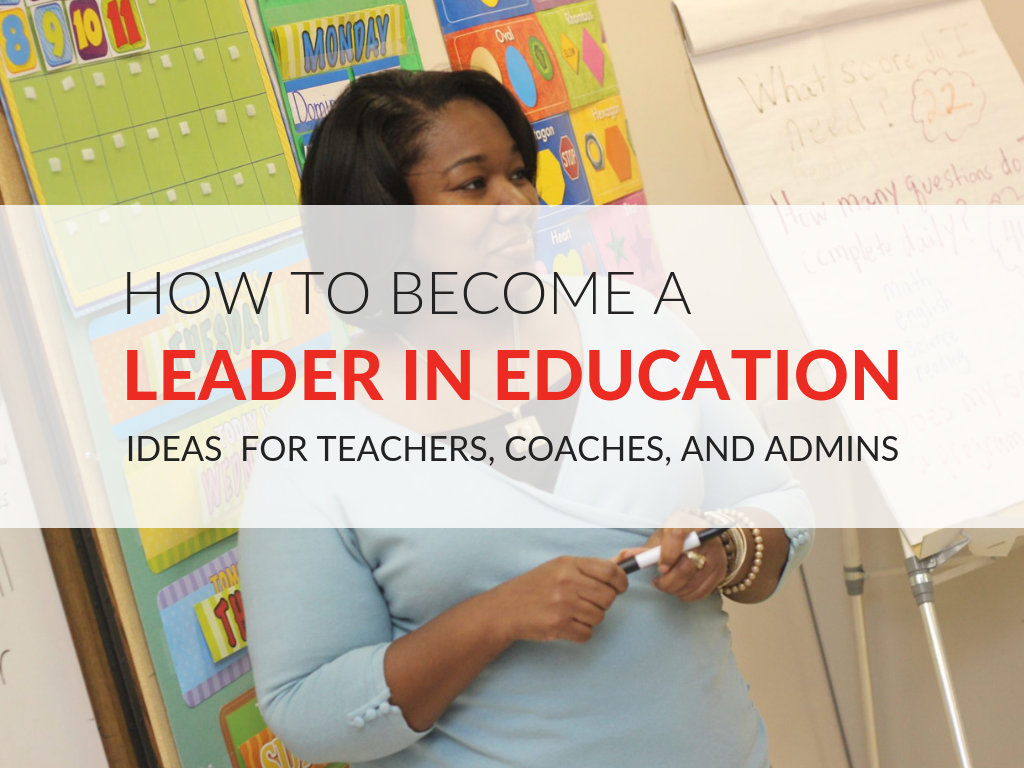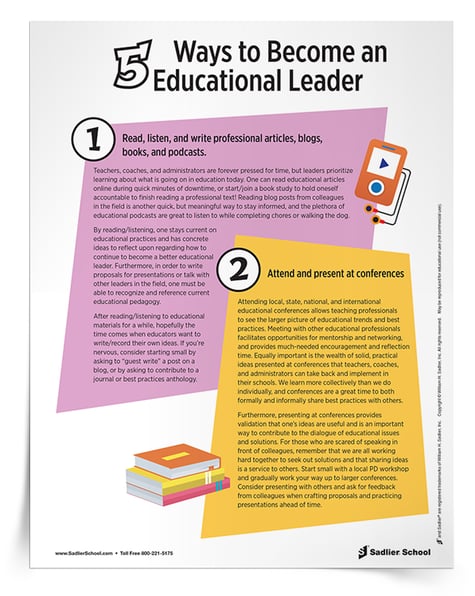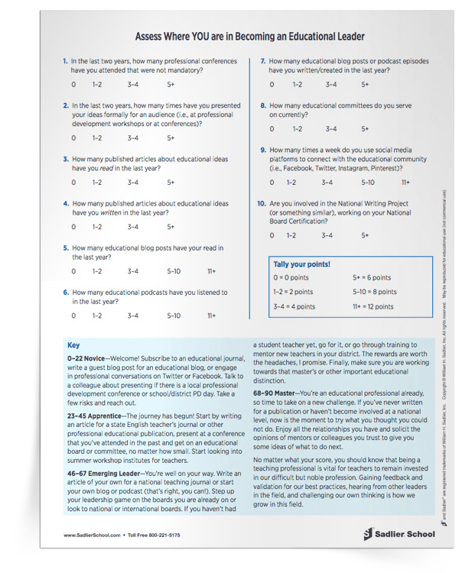April 25, 2019 ELA Resources - Assessment, ELA Resources - Tip Sheets, ELA PD - Leadership, ELA PD - Vocabulary, ELA Focus - Vocabulary
5 Ways to Become an Educational Leader
By: Vocab Gal
In this article, I'm providing teachers, educational coaches, and administrators with my top five ideas to develop as a leader, including a myriad of solutions tailored to educational experiences based on their Becoming an Educational Leader Assessment results. Whether you are a novice educator or a seasoned veteran, taking the time to consider ways to push yourself to move to the next level is vital to finding continued success in our incredibly difficult yet rewarding profession. Download my educational leader resources now.

When I was a young teacher, I stood in awe of my colleagues who presented at conferences, served on educational boards, and wrote educational books. I saw them as distinguished figures who I could only admire from afar, and believed I would not be able to join their ranks for at least fifteen, if not twenty, years.
Yet even from my earliest days as a teacher, I was ambitious; I was determined be the best darn English educator I could be by utilizing up-to-date teaching theories and methods. I enjoyed being innovative, collaborating with colleagues, and enthusiastically sharing my passion for authors and books with my students. However, it wasn’t until a board member of OCTELA (the Ohio affiliate of NCTE) asked me to attend a board meeting, that I realized I was on my way to becoming an educational leader.
I define educational leaders as those who step outside their classrooms and engage with colleagues and experts, who take time to reflect, and who are always willing to learn from the wider world of educational best practices. Leaders are those who mentor new teachers and volunteer on educational boards or committees, pursue further education, and/or seek out enriching opportunities for themselves as members of the teaching profession.
Essentially, one does not have to have written a book on educational practices or have been asked to speak at a conference to be a leader in our field, but simply have a growth mindset and a willingness to take on challenges.
Download the 5 Ways to Become an Educational Leader Tip Sheet & Assessment to get ideas for growing into a leader in education and an assessment to gauge where you are at in your growth.
5 Ways to Become an Educational Leader
1. Read, listen to, and write professional articles, blogs, books, and podcasts
Teachers, coaches, and administrators are forever pressed for time, but leaders prioritize learning about education. One can read educational articles online during quick minutes of downtime, or start/join a book study to hold oneself accountable to finish reading a professional text—I did both! Reading blog posts from colleagues in the field is another quick but meaningful way to stay informed, and the plethora of educational podcasts are great to listen to while completing chores or walking the dog.
By reading/listening, one stays current on educational practices and has concrete ideas to reflect upon regarding how to continue to become a better educational leader. Furthermore, in order to write proposals for presentations or talk with other leaders in the field, one must be able to recognize and reference current educational pedagogy.
After reading/listening to educational materials for a while, hopefully the time comes when educators to want to write/record their own ideas. If you’re nervous, consider starting small by asking to guest write a post on a blog (hint: feel free to email me with ideas), or asking to contribute to a journal or best practices anthology.
For example, I had thought about writing blog content for Sadlier back in 2010, and when I mentioned this to the marketing director, it turned out that she had been mulling over how to create a blog and here we are, eight years later! Similarly, several years ago I wanted to review audiobooks, and so I emailed the creators of my favorite YA literature review site, Girls in the Stacks; they agreed right away, as they had been looking for other contributors.
It took me many years to realize I could ask, but once I did, I’ve been writing a great deal. I still have many goals—to write a book, to be a guest on a podcast, etc., and I just have to be bold enough to keep challenging myself further and carving out the time to continue to read, to listen, and to write in order to hone those skills.
2. Attend and present at conferences
Attending local, state, national, and international educational conferences allows teaching professionals to see the larger picture of educational trends and best practices. Meeting with other educational professionals facilitates opportunities for mentorship and networking, and provides much-needed encouragement and reflection time. Equally important is the wealth of solid, practical ideas presented at conferences that teachers, coaches, and administrators can take back to and implement in their schools. We learn more collectively than we do individually, and conferences are a great time to both formally and informally share best practices with others.
Furthermore, presenting at conferences provides validation that one’s ideas are useful and is an important way to contribute to the dialogue of educational issues and solutions. For those who are scared of speaking in front of colleagues, remember that we are all working hard together to seek out solutions and that sharing ideas is a service to others. Start small with a local PD workshop and gradually work your way up to larger conferences. Consider presenting with others and ask for feedback from colleagues when crafting proposals and practicing presentations ahead of time.
3. Volunteer to help by serving on education boards or committees
News flash: educational boards and committees, including state boards, need educators to run them. While I used to think such educators had to be venerable experts from the field, I learned that boards should be comprised of a mix of young to seasoned educational folk who all bring various viewpoints to the table. State testing boards are also incredibly important to get involved in, and I encourage all educational professionals to locate the names and email addresses for their state’s (or other educational governing bodies outside of the US) department of education and to reach out and sign up for their electronic newsletters and mailings.
Then, take the time to peruse the emails and find the information about how to sign up and serve on committees. Chances are, they will welcome new and interested participants with open arms.
4. Mentor new teachers and network with school, district, state and national colleagues.
I am officially our district’s mentor coordinator, and I have been mentoring preservice teachers since my fifth year as a teacher. I am a huge, passionate advocate for mentoring (as you can read in my other blog posts and tips for mentors and new teachers) , and, as I often say, I learn just as much from the young teachers as they learn from me. Not only is their passion and energy a boost to my own, but their new pedagogical ideas and activities are often great ideas that I can use in my own classes as well.
One of my favorite mentees, who has since become a dear friend, is our band director. Mentoring him, I learned as much about the field of music education from him as he learned from me from my knowledge of practical classroom management techniques and tips about school, parent and community communications.
I also had a major “aha moment” when I attended symphonic choir, something that both intimidates me and about which I am totally ignorant of the steps necessary to become successful. While Andy and I observed this exemplary choir teacher, I realized that my own insecurities about music were akin to the anxiety that some of my students felt walking into my English class when they didn’t understand the subject matter. The reflection I had that day truly made a difference in my growth as an educator.
Furthermore, working with colleagues also expands one’s ideas and one’s practices. At the urging of a presenter at our OCTELA conference, I joined Twitter. I wasn’t sure what I was doing at first, and I made a few errors. However, in time, I learned to follow #NCTEchat and #Engchat and other hashtags which fostered discussions about educational issues that were held at a certain time on a certain date. From those shared conversations with far-flung educators, I acquired new ideas and philosophies on teaching, as well as practical lesson plans and validation that my vocabulary strategies could help others. What’s more, I now see friends I had previously only know in the “Twitterverse” at conferences and on national committees.
It is a small world, and by connecting with others via social media, educational leaders can make lifelong friendships as well as network with other leaders in the field.
5. Get involved with educational opportunities outside your district—state and national summer institutes for teachers, the National Writing Project, or start work on your National Board Certification.
Early in my teaching career, I did not know that local, state, national, and international programs existed for teachers to broaden their horizons and share amazing resources with their students. A few years into teaching, my department chair shared a flyer advertising an Ohio University Saturday teacher educator program where we could study Shakespeare with OU professors and then attend a Shakespeare performance by OU college students. Lunch was provided, as well as a free book and CEU credits!
I was thrilled by the chance to attend and excitedly woke up early to drive the two hours to campus on a cold, fall Saturday morning. I had an amazing time and, after attending several more Saturday workshops, I took their week-long summer poetry workshop for teachers and stayed in the OU dorms. The next year was their “once every five years” major summer teacher trip, and a Spanish professor proposed a 10-day excursion to Spain to study Spanish artwork. I only had to pay the plane fare for one of the best and most life-changing opportunities of my career, all because my department chair had shared a flyer, and I had taken the time to go. I encourage educators to keep their eyes open, do some Google searching and talking with colleagues, and do not be afraid to try new and unique opportunities. The benefits are worth it!
In a similar vein, if you have been wanting to try the National Writing Project’s (NWP) summer workshop, sign up now! I attended a two-week multi-genre project summer NWP class with Tom Romano and Angela Faulhaber, and they remain dear friends and colleagues. In addition, I know how to write multi-genre myself and know how to inspire my students to do so, as well. Plus, many of my friends have earned graduate credit or a graduate degree by completing NWP work.
Speaking of graduate work, the opportunities provided in graduate school are substantial and allow for a great deal of educational theory, practical learning and reflection. Likewise, I completed my National Board work at the end of my graduate program and wrote my thesis on the benefits of reflection and analysis. Completing National Board Certification is certainly a tough gauntlet to pick up, but I found that having my own challenge helped my AP students recognize that we were all being tested and we all needed to strive to do our best.
In Summary
Ultimately, the themes of becoming an educational leader all go back to reflection and collaboration, hard work and a willingness to learn and grow. Being an educational leader can happen much sooner than one might initially think, and also happens even when one doesn’t quite realize that all the opportunities they are taking can lead, in the bigger picture, to finding one’s place. I am incredibly grateful for my winding path and for the many educational opportunities I sought out and was granted. As I grow older and (sometimes) wiser with each passing year, I attempt to be a little more deliberate with how I invest my time to make sure that I am remaining a thoughtful educational leader who continues to embrace challenges and seek ever to improve.
Where are you and what should be your next steps? Take this quiz and find out!





